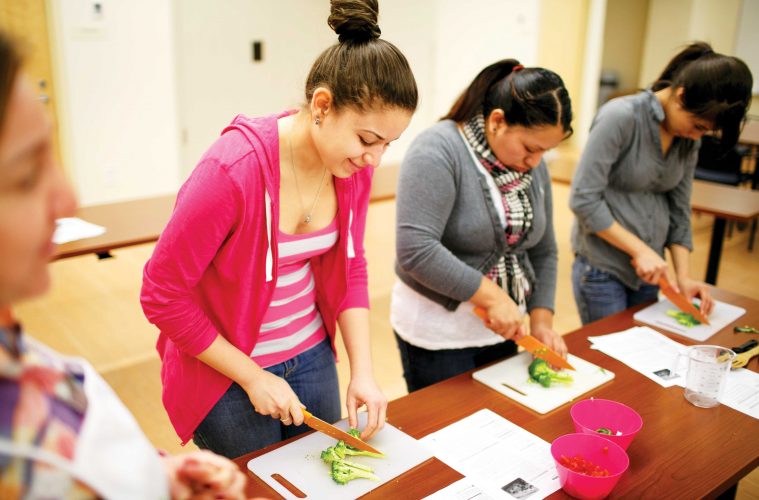There are a surprising number of people on the North Shore who have never had zucchini. While home gardeners are often overwhelmed with the prolific vegetable in season, for low-income city dwellers, taking a chance on the green squash can be intimidating.
“If you’re on a tight budget, you don’t want to waste your money on something you or your family might not eat,” says Alison Davies, a former elementary school teacher from the United Kingdom who now lives in Middleton. Helping kids connect with healthier choices has been a lifelong passion for Davies, so when seeking volunteer opportunities, she was drawn to Share Our Strength’s Cooking Matters program, which focuses on helping low-income families learn to shop smarter, use nutrition information to make healthier choices, and cook delicious, affordable meals.
Davies helps out during the six-week cooking class sessions that are a cornerstone of Cooking Matters, and she says most of the time, when a participant gets the opportunity to try something new in a low-stakes way, they are inspired, and the hands-on aspect of the class takes away the intimidation.
“Not everybody knows how to cut vegetables or hold a knife properly,” Davies says. “Growing up, if a lot of your meals are ready-prepared or takeaway, you’d never get those skills.”
The cooking classes, which are operated on the North Shore in partnership with local nonprofits like Beverly Bootstraps, Accord Food Pantry in Ipswich, and Community Action Inc. Head Start in Haverhill, offer recipes and hands-on ways to prepare healthy food with limited time and resources. A big focus is adding more vegetables—like zucchini—into meals, with recipes including the ubiquitous squash and everything from turkey tacos to tomato sauce. Because the attendees actually make the recipes during class and then eat them as a group, it makes trying new things much more approachable.
“The idea of eating healthy might seem too big and too hard for some people,” says Alicia McCabe, director of the program. “Our courses offer really small actions, so people think, ‘Ah, I can do that with my family.’”
Karen Andrew has seen the transformations firsthand. A volunteer nutrition instructor with the organization, she has taught classes in her hometown of Gloucester and often will bump into former students who share success stories, from diabetics who are able to cut back on insulin to families who are walking more and eating less processed foods.
“After I taught my first course, I was hooked,” says Andrew, who works as a health educator/supplement specialist at the Common Crow Natural Market in Gloucester. “The changes I saw take place in six short weeks in the lives of the participants were profound. I realized that I could help make a real change in people’s lives and their health with this program.”
McCabe says that instant feedback is a big draw for volunteers. “You get to watch lives change,” she says. “I’ve never had a volunteer who hasn’t appreciated the opportunity to watch lives change.”
The six classes follow a common structure but are driven by input from the attendees regarding their needs, whether they are looking to feed picky eaters or just want to buy fewer prepared foods. Each class starts out focused on a nutrition topic, like breakfast food or added sugar. Then the group heads to the kitchen to prepare a meal that incorporates the lesson. “For example, if we discuss the different food groups, we prepare a meal that includes all the food groups: protein, dairy, several vegetables, whole grains, and fruit,” Andrew says. “If we discuss the importance of breakfast, we make several breakfast options.”
It’s not all zucchini and kale, either. Andrew says the curriculum includes healthier versions of foods that the participants might normally eat. “The program does a great job of making meals such as fried chicken or chicken fingers healthier and more cost-effective than buying them prepared or at a take-out place,” she says.
Participants are also encouraged to make quesadillas at home to cut back on fat or add three different vegetable toppings to pizzas—simple solutions that add up to a more balanced diet.
Some of the lessons—like stacks of individual sugar packets showing how much added sweetener is in yogurt, canned beans, and tomato sauce—can be eye-opening. But the simple alternatives are often more cost-effective as well. “I love that they learn that it is just as easy to make a simple tomato sauce as it is to heat up a jar of sauce, and you get a better product doing it yourself,” Karen says.
A highlight for everyone is week five, when participants take what they’ve learned into the real world for a grocery store tour. After discussing everything from using unit pricing to get good value to asking the store butcher to split up a package so a customer can purchase just one or two chicken breasts, each participant is given a $10 gift card and instructed to select items from at least three food groups to craft a healthy meal.
“What is eye-opening to me is how adept [students] are at saving money on their shopping trip,” Andrew says. “They are so proud to show us what they purchased for their $10, using coupons and shopping wisely.” Participants take those groceries home, and then the next week, during their final class, they tell classmates what they made. “It is always surprising how creative they are, and how much they have learned,” says Andrew.
The grocery store tours are so popular that they are also offered as a standalone option, or even as a pop-up, McCabe says, with some 300 to 400 a year across the state. From the grocery store tours to the cooking classes, it’s people like Andrew and Davies who power the program—tours are conducted by volunteers, and each six-week cooking class requires three volunteers.
“We always have a need for volunteers’ time,” McCabe says, adding with a chuckle, “If they don’t have time, but they have money, we can make very good use of that too.”
Clearly, if you have the time, the investment comes back in spades. “People who participate seem so grateful and so energized,” Davies says. “It gives me a kick to know that I’ve been involved in something so worthwhile.” ![]()
Get Involved
From volunteering to help with a cooking class to holding a food drive collecting materials needed for classes, Cooking Matters offers a host of opportunities. For more information, visit ma.cookingmatters.org.

